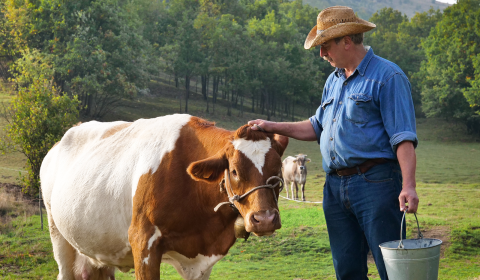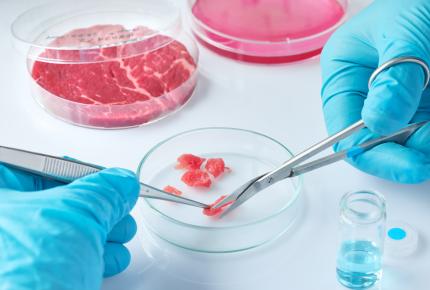
How the food industry can strengthen its commitment to animal welfare
The market demand for meat is set to double by 2050.[1] At the same time, consumer concern over animal welfare standards is increasingly impacting industry stakeholders along the food supply chain. Within this demanding consumer landscape, food industry businesses must earn trust by proving their ongoing commitment to high standards that help ensure animal welfare. Here are five actions they can take to achieve this objective.
Demonstrate accountability
Accountability and trust are the currency of the connected age. Today’s discerning consumers are less inclined to prioritize ease of access or low prices when shopping. Instead, they’re more likely to favor businesses that demonstrate genuine care about animal welfare.
This was made evident in a survey commissioned by World Animal Protection. The survey found that 89% of consumers felt that supermarkets had a responsibility to source their products from farms that adhere to best practices.[2]
Going further, another study revealed that consumers felt strongly that independent third-party audits should verify claims such as “humanely raised,” while the same number agreed that producers should exceed minimum industry standards.[3]
Safeguard quality
Low stress environments can positively impact the quality of food. Studies have shown the correlation between high stress conditions experienced by animals prior to slaughter and poor meat quality. Following recommended changes in handling routines could minimize the biological cost to animals during the preslaughter process and thus improve meat quality for consumers.[4]
Capture new markets
The current pressure on production is as much a call to accountability as it is a strategic business opportunity, according to some.[5] With new alternative protein offers on the market, traditional animal protein is encountering more competition for less share in the market.
Many companies are benefitting from certification to re-position their brand, offer new products and gain access to certain markets. Significantly, younger consumers who will make up the majority of future food markets, are more concerned and ready to pay higher prices.[6] Another survey measured willingness to pay up to 30% more for humanely raised meat.[7]
Adhere to international standards
In 2009, the European Union recognized animals as sentient beings deserving protection from preventable pain and suffering by all EU member states.[8] More recently, a set of policy initiatives outlined in the EU Green Deal, including the Farm to Fork Strategy are set to be implemented by the European Commission by 2023.
The strategy aims to broaden the scope of scientifically backed legislation and ultimately ensure better animal welfare. The following categories will come under legislative revision: protection of animals kept for farming purposes; minimum standards for the protection of laying hens, broilers, pigs, and calves; and the protection of animals during transport and at the time of killing.
As a first step in implementing changes, an Impact Assessment Roadmap was published and available for public consultation. It addressed animal welfare across four levels: farm level, during transport, at slaughter and animal welfare labelling.[9]
In spite of strides in policy revision and implementation, gaps and discrepancies in national capacities and resources persist around the globe, making standardized best practices a challenge.
The Animal Welfare Management System, the ISO/TS 34700 can serve as a base guideline to build an appropriate system. It could be used as a recommendation for conformity assessment criteria to measure adherence to international standards and set continuous improvement actions. The standard is established between ISO and The World Organisation for Animal Health (OIE).[10]
Raising the bar with Bureau Veritas
Bureau Veritas offers an audit against ISO/TS 34700 and supports organizations by creating tailored codes of conduct. Together with experts, Bureau Veritas brings the expertise from the field to support clients in creating audit programs. Trained experts also deliver audits and inspections on site to farmers, transporters or slaughterhouses.
Bureau Veritas works tirelessly to meet specific needs of food processors and other clients in order to demonstrate compliance with standards of the OIE for the welfare of all animal species.
Want to find out more about our animal welfare audit services? Learn more
Food brochure
Download[1] World Organisation for Animal Health (OIE) 7th Strategic Plan for the period of 2021-2025, https://web.oie.int/downld/SG/2021/A_88SG_14.pdf
[2] “New Research Shows Major Global Supermarket Chains at Risk of Losing Customers over Poor Pig Welfare”(news release), Cision PR Newswire, Apr 17, 2018.
[3] Animal Welfare Institute 2013 https://awionline.org/sites/default/files/uploads/documents/fa-consumer_perceptionsoffarmwelfare_-112511.pdf
[4] Effect of stress during slaughter on carcass characteristics and meat quality in tropical beef cattle. https://www.ncbi.nlm.nih.gov/pmc/articles/PMC7463084/
[5] Why Business Cares About Farm Animal Welfare https://www.wattagnet.com/blogs/23-poultry-around-the-world/post/33758-why-business-cares-about-farm-animal-welfare
[6] “Consumers’ Concerns and Perceptions of Farm Animal Welfare” Marta E. Alonso, José R. González-Montaña, Juan M. Lomillos Animals (Basel) 2020 Mar; 10(3): 385. Published online 2020 Feb 27.
[7] American Humane Heartland Farm Animal Welfare Survey, 2013 https://www.americanhumane.org/publication/humane-heartland-farm-animal-welfare-survey/
[8] Animal Welfare, European Food Safety Authority https://www.efsa.europa.eu/en/topics/topic/animal-welfare
[9] Revision of animal welfare legislation https://ec.europa.eu/food/animals/animal-welfare/evaluations-and-impact-assessment/revision-animal-welfare-legislation_en
[10] New ISO Specification for Better Management of Animal Welfare Worldwide https://www.iso.org/news/2016/12/Ref2147.html

